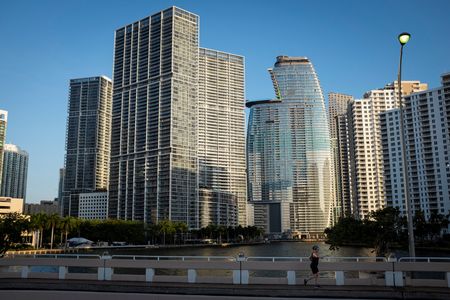By Davide Barbuscia
NEW YORK (Reuters) – Top U.S. asset manager Vanguard favors high-rated corporate debt over riskier high-yield companies’ bonds as it seeks protection against the possibility a sharper-than-anticipated U.S. economic downturn caused by high borrowing costs, it said in a report.
After one year since the Federal Reserve last raised interest rates, investors largely expect the U.S. central bank to finally start cutting rates as soon as September as inflation is cooling and the labor market is showing signs of weakness.
Vanguard, which manages over $9 trillion in assets, expects the Fed to keep rates on hold for most or all of this year due to continued economic resilience, but is cautious about the prospects of high-yield bonds, for which it plans to keep a lower-than-average allocation over the next few months.
“We are approaching a turning point in the economic cycle,” the Vanguard active fixed income team said in a third-quarter outlook report seen by Reuters. “The risk we worry about is the potential for ‘higher for longer’ to become ‘higher until something breaks’.”
Investment grade corporate bonds have seen hefty demand this year as investors searched for higher yields than those provided by safer government bonds. That has compressed investment grade credit spreads, a measure of the premium demanded by bond buyers of corporate debt over government paper.
As of Thursday, spreads stood at 93 basis points, according to the ICE BofA US Corporate Index, down from 104 basis points at the end of last year.
Those spreads would widen if the economics conditions deteriorate, said Vanguard. However, total returns – which include interest payments and price changes – should be supported by a corresponding decline in interest rates as the Fed eases monetary policy to inject fuel into the economy.
“If the broader economy weakens, our more defensive approach should hold up better and provide room to add credit back at more attractive prices,” it said.
(Reporting by Davide Barbuscia; Editing by Arun Koyyur)





